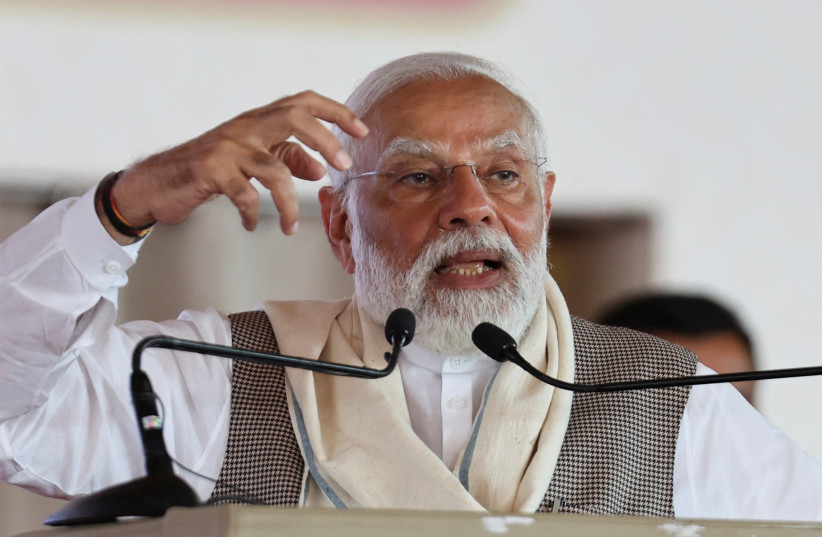On August 16, the day following India’s 78th Independence Day, an important phone call took place between Indian Prime Minister Narendra Modi and Prime Minister Benjamin Netanyahu. Modi, in a firm tone, re-emphasized the immediate and unconditional release of all hostages held by Hamas.
This conversation, set against the backdrop of escalating violence within Israel and in the areas surrounding its national borders, signals a clear and decisive shift in India’s foreign policy and military approach, both internationally and domestically.
For decades, India maintained a delicate balance in its engagement with Israel and Palestine. While India established diplomatic relations with Israel in 1992, it also remained a strong supporter of the Palestinian cause, often advocating for a two-state solution and maintaining cautious neutrality in the Israel-Palestine conflict.
This policy was shaped by India’s non-aligned movement roots, its large Muslim population, and broader geopolitical considerations. However, recent events suggest that this long-standing policy is undergoing a profound transformation.
India’s open and unequivocal support for Israel in its conflict with Hamas and Iranian-backed proxies, notably Hezbollah, marks a significant departure from its traditional approach.

The strategic partnership between India and Israel has grown considerably in recent years, with deepening ties in defense, agriculture, and technology. The relationship has moved from being covert to overt, and the solidarity expressed by Modi during his conversation with Netanyahu underscores a new era in India’s diplomatic and military posture – one characterized by assertive alignment with key international allies and a decisive stance on issues of global and regional security.
The abrogation of Article 370 in Jammu and Kashmir in August 2019 was a watershed moment in India’s internal security policy. The revocation of the region’s special status was justified by the Indian government as a necessary step to combat terrorism and promote development.
However, the reality on the ground has been more complex. Recent militant attacks in the Jammu region, such as the ambush on an Indian army convoy in Kathua and the assault on a bus carrying Hindu pilgrims in the Reasi district, illustrate that the insurgency has not been subdued. Instead, it has shifted geographically, resembling the evolving patterns of violence observed in Israel’s conflict with Hamas.
India changes strategy
India’s changing military strategy is evident in its increasingly aggressive posture toward cross-border terrorism. The surgical strikes conducted by Indian forces against terrorist camps in Pakistan-administered Kashmir in 2016, followed by airstrikes in Balakot in 2019, were clear indicators of a more proactive and preemptive approach. This mirrors Israel’s long-standing policy of targeted strikes against militant groups that pose an imminent threat to its national security.
Moreover, the introduction of new legal frameworks, such as the Bharatiya Nyaya Sanhita (BNS) and the Bharatiya Nagarik Suraksha Sanhita (BNSS), which emphasize stringent measures against threats to national security, reflects India’s commitment to a no-tolerance policy toward extremism, both domestically and at its borders.
These laws, coupled with the government’s push to arm local villagers in border areas like Jammu as a countermeasure against insurgent attacks, demonstrate a resolve to fortify internal defenses – a strategy not dissimilar to Israel’s own policies of civilian defense.
Critics may argue that India’s open support for Israel could jeopardize its ties with important Middle Eastern countries, especially those with large Palestinian sympathies. However, given the evolving geopolitical landscape, where strategic and economic objectives outweigh ideological alignments, it appears that India is adjusting its foreign policy to better suit its national interest imperatives.
India’s vocal support for Israel in its conflict with Hamas and Hezbollah can also be interpreted as a signal to both domestic and international audiences that it will not shy away from taking clear and decisive stances on cross-border threats and strategic alliances. This new posture reflects a convergence of diplomatic support and military pragmatism, underscoring India’s commitment to securing its borders, protecting its citizens, and advancing broader regional interests.
As India continues to navigate its complex regional dynamics, this shift toward a more assertive and less ambiguous stance in its foreign and domestic policies could redefine its role on the global stage. The phone call between Modi and Netanyahu on India’s Independence Day may very well be remembered as a pivotal moment in India’s diplomatic and military evolution.
The writer is an India-based lawyer specializing in cross-border trade and investments and a fellow with the South Asia Democratic Forum in Brussels.
